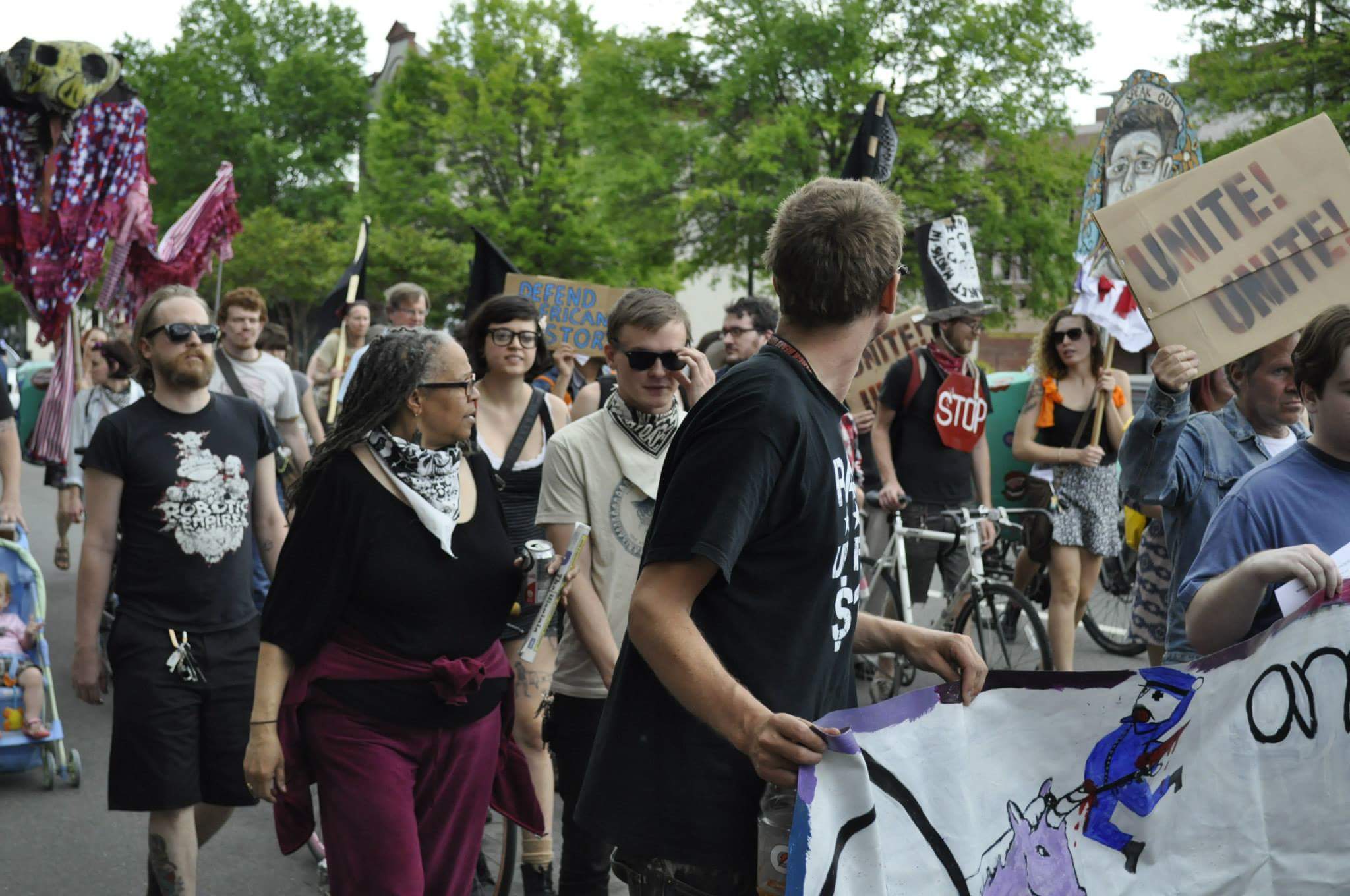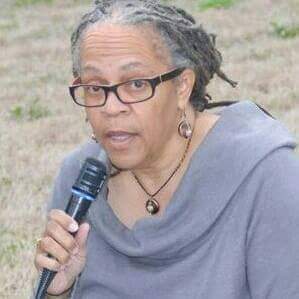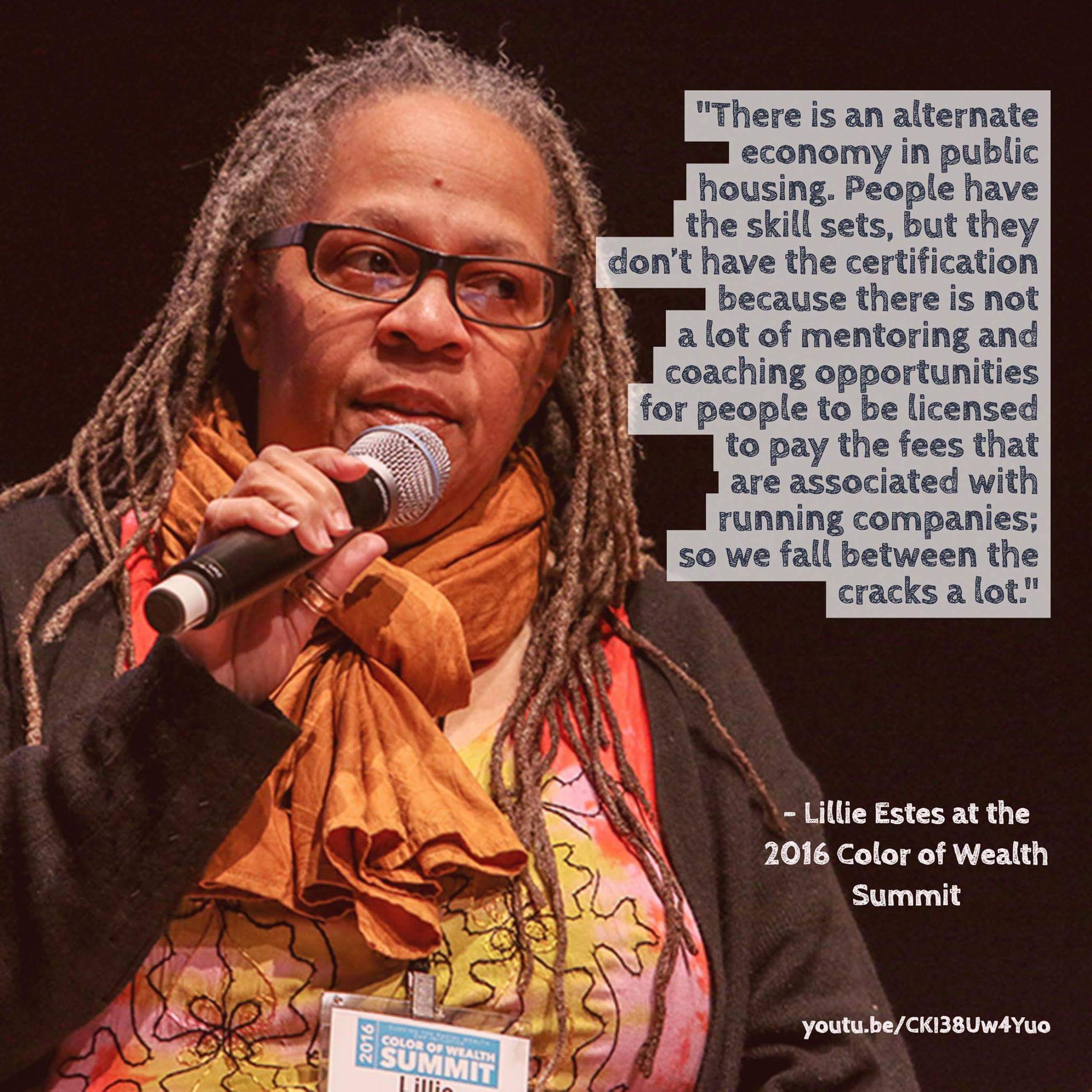Lillie Estes in action at a May Day march, 2015. Photo, courtesy of Lille Estes
Lillie Estes is a force of nature. There really is no other way to say it. When she took the stage at Harvard Law School for “Justice Works: Dispatches from the Front Lines of Community Justice,” it was clear that the term “community justice” embodied her lived experience. At a time when Massachusetts’ advocates are hoping to get criminal justice reform passed and are depending on legislation to help transform lives, “community justice” is an alternative, vibrant, and hopeful path towards achieving change.
Community justice, as defined on the Charles Hamilton Houston Institute for Race & Justice’s (CHHIR&J) website is “the process of building public policy by incorporating the voices, knowledge and aspirations of individuals living and working in communities decimated by decades of disinvestment, neglect and over-policing.” The CHHIR&J has been pioneering community justice programs at the law school in order to present viable alternatives to the overly harsh and often misguided policies permeating today’s punishment system. On October 3rd, “Justice Works” was one of those programs and featured a variety of speakers who had found ways to demand change on a local level— engaging those who are most impacted and encouraging them to speak out against injustices and for progressive policies.
David Harris, executive director of the CHHIR&J, calls Lillie Estes “the heart and soul of Richmond, Virginia.” In an email, he added, “She has devoted decades to make real the common idea that people in communities must guide their own destiny.”
In a phone interview, Estes called herself a “community strategist.” She spoke about how she has been on a “spiritual journey” from her first efforts to improve the community as a high school student in Newport News, Virginia, and soon after as an active member of the NAACP Youth Council. She moved to Richmond more than 35 years ago.
One of her current passions is RePHRAME or Residents of Public Housing in Richmond Against Mass Eviction. In an op-ed, which Estes co-wrote for the Richmond Times-Dispatch with several other authors, she stated “In Virginia, someone would have to work 128 hours per week at minimum wage to afford a two-bedroom rental home at fair market rent. And in Virginia, landlords have many more rights and protections than tenants.”
To help protect citizens in public housing, Estes said she co-founded RePHRAME, and it has become an example of community justice at work. Estes lives in public housing herself. She said the challenge and the key to getting residents involved is approaching folks on a personal level, letting them know that “Even if I have the power, I will acknowledge your wisdom in your capacity.” She is not above knocking on doors to get residents engaged in change, what she calls a “labor of love and work in progress.” Community meetings and consensus are part and parcel of her process. Estes said it took her five years to convince someone to join the board of RePHRAME because “so many people [in public housing] feel they don’t have any value.” She “pitches it so they don’t get captured by other people.”
RePHRAME’s ambitious work includes: making sure residents do not lose their public housing if redevelopment occurs; as planning for newly created public housing units takes place, insisting that employment, education, and other opportunities from development go to public housing residents; assuring that residents have a voice in decisions regarding their housing and their communities; working to avoid late fees tacked on to rent because of posal system delays. Estes already has helped implement a residents’ “bill of rights” for redevelopment.
A 2016 article in the Richmond Free Press detailed a few of Estes’ other efforts. She serves on the advisory board of the city’s Maggie L. Walker Initiative for Expanding Opportunity and Fighting Poverty. According to the Sun, “The group presented an action plan to Mayor Dwight C. Jones in 2013 to help alleviate poverty in Richmond, where one in four city residents lives at or below the poverty level.” She was instrumental in developing a position in the mayor’s Office of Community Wealth Building to help implement poverty-fighting initiatives. Estes serves on the board of the Virginia Poverty Law Center. She is also behind the 2017-18 Community Justice Film Series in Richmond which is using film as a catalyst for community engagement and promoting “forward-thinking dialogue” around themes such as education, housing, publlc safety, whole body health, transportation, job creation, and wealth building.
Part of improving public housing is improving all of the above issues for residents. Indeed, it is not insignificant that those issues contribute to the life expectancy in the public housing complex where Estes resides—63 years, the lowest in Richmond. According to a Virginia Commonwealth University report, in a suburb just five miles away, people are living twenty years longer.
David Harris pointed out in his email that Estes has continued “to work tirelessly against great odds to identify and amplify” voices of members of impaced communities. Estes told me that her eldest son was murdered in 2010, three days before his 24th birthday. Her son’s best friend, she said in a Richmond Times-Dispatch article,was shot to death on New Year’s Day in South Richmond. Another son is in college and hopes to be a lawyer, and he attended the Harvard event with her. She has worked hard to fight against violence of any kind and to hold her city accountable. She shared that when her mother had a stroke when she was young, Estes learned to speak for her, an art that has truly helped her understand others.
Mothers for Justice and Equality, a national group based in Boston whose mission is to empower mothers to end violence in the streets, awarded Estes a “Mother of Courage Award” in 2016 for her work. Surely there is no one who is more deserving.
Head shots courtesy of Lillie Estes
As Lillie Estes continues to work for justice in Richmond and surrounding communities, the Houston Institute continues to present important events to amplify the voices of those living and working in communities hardest hit by crime and violence, and to feature activists who champion these issues around the nation.



